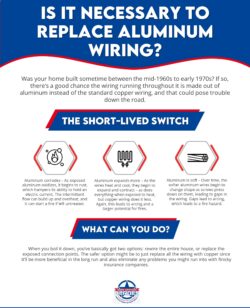Was your home built sometime between the mid-1960s to early 1970s? If so, there’s a good chance the wiring running throughout it is made out of aluminum instead of the standard copper wiring, and that could pose trouble down the road. Don’t fret too much, however, because it also stands to reason that nothing may be wrong at all. However, insurance companies might choose not to insure homes with aluminum wiring because of the danger they pose.
Depending on how your home has aged, it might be prudent to replace the aluminum wiring and replace it with safer copper. The electricians at Home Service Heroes have provided a quick run-down of everything related to aluminum wiring: the differences between it and copper, why it was installed, the reasons it’s dangerous, and what you should be on the lookout for before you consider replacing it. If — after taking stock of the status of your home’s wiring – you decide rewiring is in your best interest, give us a call and let our licensed electricians take care of it. It’s a dangerous job and trying to make it a DIY task could end up being harmful.
The Short-Lived Switch

In 1965, technicians started outfitting homes with aluminum wiring instead of the usual, more expensive copper versions. This change didn’t even last a decade, though, as the return to copper occurred in 1972 after it became apparent the financial savings weren’t worth the problematic parts of dealing with aluminum-outfitted homes. Why’d they made the switch back, so soon? A few reasons.
- Aluminum corrodes – As exposed aluminum oxidizes, it begins to rust, which hampers its ability to hold an electric current. The intermittent flow can build up and overheat, and it can start a fire if left untreated.
- Aluminum expands more – As the wires heat and cool, they begin to expand and contract – as does everything when exposed to heat, but copper wiring does it less. Again, this leads to arcing and a larger potential for fires.
- Aluminum is soft – Over time, the softer aluminum wires begin to change shape as screws press down on them, leading to gaps in the wiring. Gaps lead to arcing, which leads to a fire hazard. The Consumer Product Safety Commission actually ruled that a home with aluminum wiring is 55 times more likely to reach conditions appropriate for a fire hazard than a home with copper wiring.
What Can You Do?
When you boil it down, you’ve basically got two options: rewire the entire house, or replace the exposed connection points. The safer option might be to just replace all the wiring with copper since it’ll be more beneficial in the long run and also eliminate any problems you might run into with finicky insurance companies.
First, though, give your electrician a call and schedule an inspection, because simply having aluminum wiring isn’t enough to warrant a complete, costly overhaul of your home’s wiring infrastructure. Because, for all you know, the inspection could conclude that the aluminum connections are secure and not in any danger at all. And if that’s the case, you’ll be glad you didn’t shell out the money for a complete rewiring. We’d like to give you a definite, catch-all answer, but it really comes down to a case-by-case basis. Home Service Heroes has a team of experienced electricians who can thoroughly inspect every inch of your home’s wiring to help you determine if the aluminum connections pose a risk, and we can handle a whole-home rewiring if it is. Give us a call at (813) 696-3398 and schedule an appointment!
